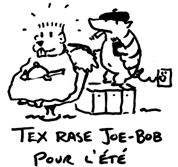6 – Le quotidien
A pronominal verb is a verb that is accompanied by a reflexive pronoun. Pronominal verbs fall into several categories based on their meaning: reflexive and idiomatic will be covered in this lesson.
You have already been using pronominal verbs, such as: Je m’appelle. To conjugate pronominal verbs in the present tense, you need to pay attention to both the pronoun and the verb form. Listen carefully to the conjugation of the following pronominal verb. The verb is conjugated normally (here an -er verb) with addition of the reflexive pronouns me, te, se, nous, vous, se.
| se raser ‘to shave oneself’ | |
| je me rase | nous nous rasons |
| tu te rases | vous vous rasez |
| il/elle/on se rase | ils/elles se rasent |
reflexive verbs
Pronominal verbs often express reflexive actions, that is, the subject performs the action on itself. If the subject performs the action on someone else, the verb is not reflexive. Here is a list of common reflexive verbs:
| se réveiller | to wake up |
| se lever | to get up |
| se laver | to wash |
| se raser | to shave oneself |
| se brosser | to brush |
| se brosser les dents | to brush your teeth |
| se brosser les cheveux | to brush your hair |
| se maquiller | to put on make-up |
| s’habiller | to get dressed |
| se coucher |
Compare the difference in meaning between se raser and raser in the following sentences. Note that English does not usually indicate reflexive meaning explicitly since it can be inferred from the context. However, if reflexive meaning is intended in French, then it must be explicitly stated by using a reflexive pronoun.
| Est-ce que Tex se rase? Mais non, Tex, c’est un tatou. Il n’a pas de cheveux. | Does Tex shave? Why no, Tex is an armadillo. He has no hair. | |
| Qu’est-ce qu’il fait, Tex, avec le rasoir? Il rase Joe-Bob pour l’été. | What’s Tex doing with the razor? He’s shaving Joe-Bob for the summer. |

To negate pronominal verbs, place the ne before the reflexive pronoun and the pas after the verb. When used with an auxiliary verb such as aimer (to like), the infinitive of a pronominal verb agrees with its subject. When pronominal verbs are used with parts of the body, they take the definite article (le, la, les) rather than the possessive article as in English: Tex se lave les mains. (Tex washes his hands.)
| Joe Bob: Edouard, est-ce que tu te rases? | Joe Bob: Edouard, do you shave? | |
| Edouard: Non, je ne me rase pas. | Edouard: No, I don’t shave. | |
| Les escargots ne se rasent pas. Pourtant, nous nous lavons le visage tous les jours. | Snails don’t shave. However we do wash our faces every day. | |
| Joe-Bob: Ah, tu as de la chance. Je déteste me raser. |
idiomatic verbs
Some pronominal verbs are idiomatic and do not represent reflexive actions per se. s’amuser (to have fun) and se reposer (to rest) are examples of pronominal verbs with idiomatic meanings. The following list includes common idiomatic pronominal verbs:
| s’amuser | to have fun |
| se dépêcher | to hurry |
| se promener | to take a walk |
| s’ennuyer | to be bored |
| s’entendre | to get along |
| se fâcher | to get angry |
| se marier | to get married |
| se reposer | to rest |
| se sentir | to feel |
| se souvenir de | to remember |
| se taire | to be silent |
| se tromper | to make a mistake |

